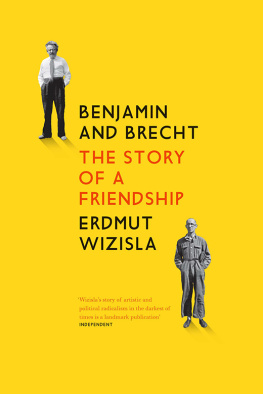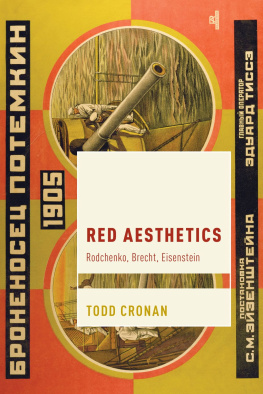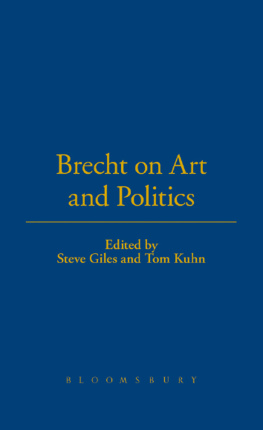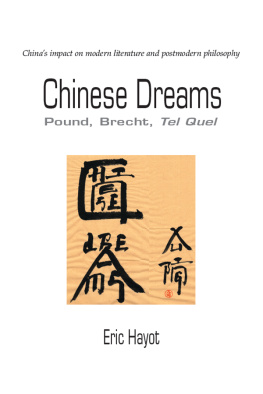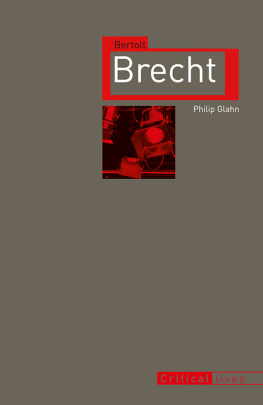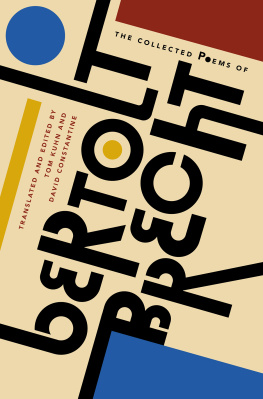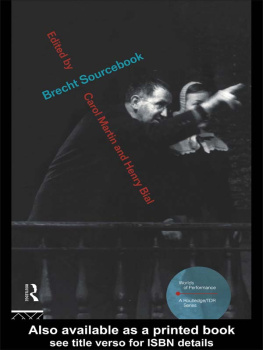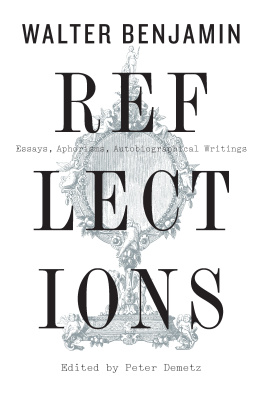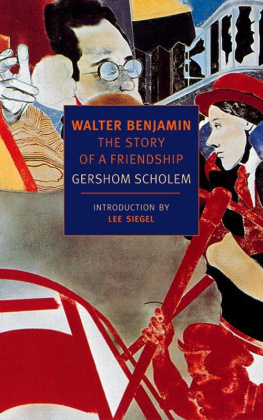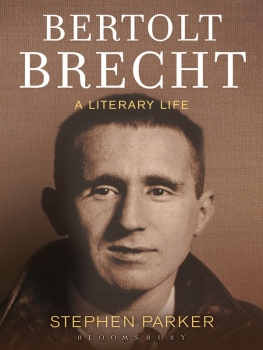This work, which began as a doctoral thesis in the former East Germany (the German Democratic Republic), was completed in 1993, three years after German reunification. The author substantially rewrote it for publication in 2004. This English-language edition has, with the authors agreement and participation, in turn been modified for a further new readership. The intention is to make it available to an English-reading public, including those who know German but who prefer to read a substantial study like this one in their own language, or even if English is not their first language in English rather than in German. This means that, where published English translations of books, articles or poems exist, such sources are quoted and/or cited. This involves primarily the work of Benjamin and Brecht themselves, but also that of Theodor W. Adorno, Gershom Scholem, and Hannah Arendt among others. In all these cases, quotations in this edition have been taken wherever possible from the published English-language source, to which reference is made. Where translations of passages quoted do not exist, they have naturally been translated, but the German reference has been retained. This also applies to any secondary literature, whether quoted or mentioned. In one or two cases, reference to a standard English-language work has replaced or supplemented an original, untranslated, German-language secondary work (see the List of Works Cited, ).
The German edition contains a section (in the first chapter) of detailed discussion on the debate, dating from 1967, about the initial republication and publication of Benjamins work in Germany from the mid fifties. This politically founded controversy, albeit generally conducted in scholarly and philological detail, remained a parochial, inner-German affair. None of the books and, mainly, articles referred to in this respect in the German edition is available in English. Consequently, all material pertaining exclusively to this past controversy, as well as some other references that refer to exclusively German philological matters, has been omitted.
1924
Summer, Capri WB asks the theatre director from Riga, Asja Lacis, whom he had got to know on Capri, to introduce him to Brecht who is staying in Positano. Brecht is not interested.
November, Berlin Lacis persuades BB to meet WB. The meeting takes place in Meierottostrasse 1, a pensione for artists, but nothing transpires and the two men then seldom meet.
1925
Berlin WB and possibly BB attends meetings of the Philosophy Group.
December An article for Querschnitt by WB and Bernhard Reich arguing for a looser form of cabaret revue indicates considerable knowledge of BBs theatrical work.
1926
8 November, Berlin WB and BB meet at the literary trial of Johannes R. Bechers novel Levisite, by the 1925 Group.
6 December, Moscow WB tells Asja Lacis and Bernhard Reich about BB immediately on arriving in Moscow.
1927
WB, BB, Klabund, Carola Neher and Soma Morgenstern meet Ludwig Hardt after a recitation evening by Hardt. Debate about Trotsky.
13 April, Paris WB expresses the wish to review BBs Devotions for the Home for the Frankfurter Zeitung.
1928
13 July, Berlin WB and BB each respond to a Literarische Welt questionnaire about Stefan George and German intellectual life.
1929
30 March, Berlin WB goes to the premire of Marieluise Fleissers Pioniere in Ingolstadt, which BB is involved in directing. The play, wrote WB, shows the collective powers created in the uniform masses, and which are counted on by clients of the military.
6 June, Berlin WB informs Gershom Scholem that he has got to know BB.
23 June, Frankfurt In a review in the Frankfurter Zeitung of Gedichte, Lieder und Chansons by Walter Mehring, WB refers to BB as the best chansonnier since Wedekind.
24 June, Berlin WB tells Scholem in a letter that his very friendly relationship with Brecht is based on the well-grounded interest one is bound to have for his present plans.
30 August, Berlin In an article in the Frankfurter Zeitung on a conversation he had had with the radio broadcaster Ernst Schoen, WB reports that Schoen has interested BB in working on radio features.
Summer/Early Autumn, Berlin Ernst Bloch persuades WB to formulate his Brecht-spell.
18 September, Berlin WB writes Gershom Scholem that not much honour accrues to Happy End.
20 October, Berlin Premire of Karl Krauss post-war drama Die Unberwindlichen (The Invincibles) at the Volksbhne. In the 1 November issue of the Literarische Welt, WB reviews the play, which initially BB was going to direct at the Theater am Schiffbauerdam.
1930
18 April, Berlin In a conversation with Siegfried Kracauer WB confesses to being very taken with the recently published first volume of the Versuche. He drafts a commentary on it.
25 April, Berlin WB and BBs plan to annihilate Heidegger in a critical reading-group fails because BB is away.
24 June, Frankfurt WB gives his radio talk Bert Brecht on Sdwestdeutscher Rundfunk.
6 July, Frankfurt WBs From the Brecht-Commentary is published in the Frankfurter Zeitung.
September WB, BB, and Herbert Ihering plan to edit a journal for Rowohlt. In discussing its programme they agree on the social role of intellectuals, develop educational ideas, and devise a catalogue of writing styles. The work is to develop in three stages: i) creation of a capitalist pedagogics, ii) creation of a proletarian pedagogics, iii) creation of a classless pedagogics.
8 September, Berlin According to Ernst Rowohlt WB, BB and Herbert Ihering are ready to work on the journal, whose general position is moving sharply left.
Autumn, Berlin BB sees the following as editorial directors of the journal: Herbert Ihering, WB, Bernard von Brentano, and himself.
3 October, Berlin WB informs Gershom Scholem that he and BB have formulated the principles of

